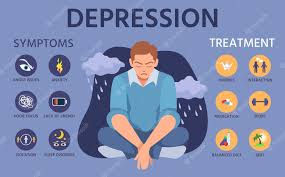Depression and anxiety are common mental health disorders that can have a significant impact on an individual’s quality of life. According to the World Health Organization (WHO), depression is the leading cause of disability worldwide, and anxiety disorders are the sixth leading cause. In this article, we will explore the causes, symptoms, and treatments of depression and anxiety.
Causes of Depression and Anxiety:
Depression and anxiety are complex disorders with multiple causes. Some possible factors that may contribute to the development of these disorders include:
- Genetic factors: There is evidence to suggest that depression and anxiety can run in families, indicating that there may be a genetic component to these disorders.
- Brain chemistry: Imbalances in neurotransmitters, which are chemicals in the brain that regulate mood, can contribute to the development of depression and anxiety.
- Environmental factors: Trauma, abuse, neglect, and other adverse experiences can increase the risk of developing depression and anxiety.
- Medical conditions: Certain medical conditions, such as thyroid disorders and chronic pain, can contribute to the development of depression and anxiety.
Substance abuse: Substance abuse can increase the risk of developing depression and anxiety, and may also exacerbate symptoms in individuals who already have these disorders.
Symptoms of Depression and Anxiety:
Depression and anxiety can present with a range of symptoms, which may include:
Depression:
- Persistent feelings of sadness, hopelessness, or emptiness
- Loss of interest in activities that were once enjoyable
- Fatigue and loss of energy
- Difficulty sleeping or oversleeping
- Changes in appetite and weight
- Difficulty concentrating, making decisions, or remembering things
- Feelings of worthlessness or guilt
- Thoughts of death or suicide
Anxiety:
- Excessive worry or fear
- Restlessness or feeling on edge
- Muscle tension or trembling
- Irritability
- Difficulty concentrating
- Sleep disturbances
- Panic attacksIt’s important to note that while depression and anxiety share some symptoms, they are different disorders with distinct diagnostic criteria.
Treatment of Depression and Anxiety:
Treatment for depression and anxiety typically involves a combination of medication, therapy, and lifestyle changes.
Medication:
Antidepressant and anti-anxiety medications can be effective in treating depression and anxiety by altering the levels of neurotransmitters in the brain. Selective serotonin reuptake inhibitors (SSRIs) and serotonin-norepinephrine reuptake inhibitors (SNRIs) are commonly prescribed antidepressants, while benzodiazepines and beta-blockers may be prescribed for anxiety.
Therapy:
Therapy can be a valuable tool in treating depression and anxiety. Cognitive-behavioral therapy (CBT) is a type of therapy that helps individuals identify and challenge negative thoughts and behaviors that contribute to their symptoms. Other types of therapy, such as interpersonal therapy (IPT) and psychodynamic therapy, may also be helpful.
Lifestyle changes:
In addition to medication and therapy, lifestyle changes can also be helpful in managing depression and anxiety. Some strategies that may be effective include:
- Exercise: Exercise has been shown to be effective in reducing symptoms of depression and anxiety by releasing endorphins and reducing stress hormones.
- Nutrition: Eating a healthy diet with plenty of fruits, vegetables, and whole grains can help support overall health and may also have a positive impact on mood.
- Sleep: Getting enough sleep is important for overall health, and can also help reduce symptoms of depression and anxiety.
- Stress reduction: Stress can exacerbate symptoms of depression and anxiety, so finding ways to manage stress, such as meditation or yoga, can be helpful.
- Social support: Having a strong support network of friends and family can help individuals
Depression and anxiety quotes
Depression and anxiety are two of the most common mental health disorders affecting millions of people worldwide. Both can be debilitating and have a significant impact on a person’s life. Here are some powerful quotes that can help those struggling with depression and anxiety:
- “I have depression and anxiety. I feel like I’m underwater, and I have to remind myself to breathe.” – Unknown
This quote captures the feeling of being suffocated by depression and anxiety. It reminds us that even when it feels like we’re drowning, we must keep going and remind ourselves to breathe. - “You don’t have to control your thoughts. You just have to stop letting them control you.” – Dan MillmanThis quote highlights the importance of taking control of your thoughts and not letting them consume you. It’s a powerful reminder that you have the power to choose how you react to your thoughts.
- “The only way out of the darkness is to step forward into the light.” – Unknown
This quote is a reminder that even when things feel bleak, there is always hope. It encourages us to take that first step towards the light, no matter how small it may be. - “Anxiety does not empty tomorrow of its sorrows, but only empties today of its strength.” – Charles SpurgeonThis quote reminds us that anxiety can rob us of the present moment, making it difficult to enjoy life. It encourages us to focus on the present and find strength in the here and now.
- “Depression is like a bruise that never goes away. A bruise in your mind.” – Jeffrey Eugenides
This quote describes the long-lasting impact that depression can have on a person. It highlights the importance of seeking help and support to heal the bruise and move forward.
In conclusion, these quotes offer comfort, hope, and encouragement to those struggling with depression and anxiety. They remind us that we are not alone and that there is always hope for a brighter future.

